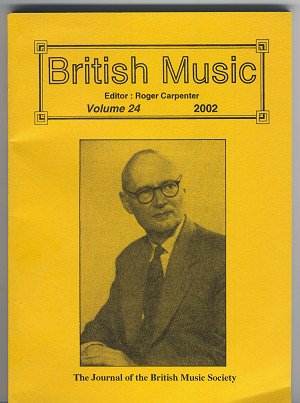The British Music Society does a huge service to British
Music . This is especially apparent in its efforts to represent the
lesser known composers and artists. I presume much of what can be written
about Elgar, Britten and Delius has already been penned. It is with
the margins of the discipline that this Society deals best. One just
needs to look at the list of society publications, both written and
recorded, set out on the back of the journal, to see what I mean [see
also website]. There are
chamber works on CD by York Bowen and Cyril Scott; an excellent book
that has just been republished, Goodnight to Flamboro' all about
William Baines and of course the helpful British Composer Profiles.
The 23 previous issues of this magazine have built
up an impressive record of musical achievement in this 'Land
without Music.' Some two thousand pages of close written text and
illustration pay tribute to a host of lesser-known composers and little
known details about more famous composers. One of the best things about
these journals is the reprinting or first publication of a number of
compositions. It was in an earlier journal that I first saw the score
of one of my great desiderata for the piano recording studio, Greville
Cooke's Cormorant Crag. From the pen of a priest his is a fine
work - almost symphonic in its conception. (Axe grinding!)
The present Volume 24 is one of the most interesting
issues of the Journal of the British Music Society that I have read
in a number of years. It is almost as if it were written just for me.
There are articles about two or three composers whom
I have long regarded as being in need of repristination or in some cases
plain recognition. These include the Welsh composer Mervyn Roberts,
the Scottish composer and educationalist Alexander Mackenzie and a fine
centenary portrait of the 'Geordie' composer Percy Turnbull.
Recently I
reviewed a marvellous CD by Louise Farrenc, a French composer, who
unusually for a lady wrote two symphonies. It is exceedingly encouraging
to discover our very own Victorian symphonist in the person of Alice
Mary Smith.
There is a reprint of Six Sonnets, written by
Jon Manchip White in tribute to Jack Moeran, which were originally published
in 1948. Finally there is a facsimile of the same composer's Norfolk
folksong, One Morning in Spring.
It is not necessary to comment in detail about all
these articles - they are all well written and provide fascinating insights
into obscure corners of our art. However a few observations are appropriate.
Mervyn Roberts is one of those composers of whom I
am aware but have not really heard much of his work. Recently there
has been a CD of two-piano music, On Heather Hill, recorded by
Bruce Posner and Donald Garvelmann. (Olympia OCD 680 review).
Yet there is a reasonable catalogue of piano and vocal music that just
cries out to be explored. It is easy to suggest that this music is in
the style of Ireland and Bax - but this does not recognise the obvious
fact that no composer writes music in a vacuum. Roberts brings exquisite
craftsmanship to his writing and composes music that is interesting
and satisfying in its own right. It is just a pity that Colin Scott-Sutherland's
article will appeal to the naturally curious if not the already converted.
Jürgen Schaarwächter considers Alexander
Campbell Mackenzie in the context of Victorian and Edwardian choral
music. I know a number of this composer's orchestral works - thankfully
Hyperion have released a fair few of them on CD. However, apart from
a few yellowing Novello vocal scores in my possession I have heard nothing
of his choral works. Surely his 'Columba' and one or other of
the Robert Burns' works deserve at least one revival over the coming
few years.
It is easy to think of Victorian women composing drawing
room or salon music. Yet just look at the achievements of the novelists!
The Brontes, Radcliffe and Braddon for example. So it is perhaps not
too surprising to discover a lady who wrote big music: the symphonies
of Alice Mary Smith to be precise. It is hard to comment on their worth
until one hears them - but according to Ian Graham-Jones, who is preparing
a performing edition of these works, they are well worth an airing.
Let us hope that when he has finished his editing that some resourceful
recording company will issue them on CD.
There is an extremely specialist article on R.R. Terry
who was instrumental in the revival of early church music. George Sharman
considers Terry in light of his editorial work and also his original
contribution to liturgical music, which was considerable.
Jeremy Dibble's excellent portrait of the Newcastle
born composer Percy Turnbull is fascinating. He was not a prolific composer,
but if one listens to the recording made by SOMM CDs of his
piano and vocal works
one sees that he is a neglected master. Maybe he is not in the first
rank of composers, but certainly his music is fresh and interesting
even if slightly derivative of the standard piano repertoire.
This is not only a good read but also an indispensable
part of a serious British Music archive. It ought to encourage the British
Music enthusiast to subscribe to this most worthwhile organisation to
ensure that the music they love and cherish is promoted in the years
to come. It is so important that the lesser names in the musical pantheon
are written and enthused about. Life would be so boring if we only had
the Big British Five to listen to all the time.
John France
